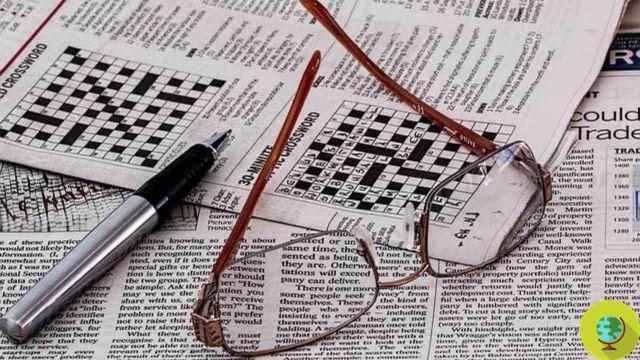
They help keep our thinking and attention skills active and more: all the amazing benefits of crosswords.
Don't store avocado like this: it's dangerousIt is now over 108 years old, but it remains the best pastime of any era. He trains the brain and keeps memory and concentration active. That's why he's good at doing a crossword puzzle and not just on the beach in the summer
Reading definitions and stringing responses, concentrating and striving to get to the right one: what seems like an elderly hobby (and that young people actually hardly know), his majesty the crossword puzzle it is actually the most productive thing that can stimulate our brain.
If our mistreated brain is in fact an organ that must always be kept in training through the "gymnastics" that best suit its needs (for which it remains essential to read and use thought positively, for example), it will also be necessary to make it work in the pure sense of finish and devote a few minutes a day to crossword puzzles (as well as sudoku or board games). A real cure-all for our brain!
Read also: Writing by hand makes you smarter
Here they are then the benefits of the crossword puzzle, which in the 2020 has come to the ripe old age of 107. In fact, it was born on December 21, 1913 in the pages of a New York newspaper and since then it has never ceased to be the favorite pastime of most.
Studies on the benefits of crosswords
From the "Protect" study, published in the International Journal of Geriatric Psychiatry in 2019, in which 19 thousand participants were subjected to cognitive tests to test the level of attention, memory and reasoning, it emerged that people used to play word or number games they got the best score on the test. Indeed, those who habitually solved puzzles proved to have amental age 10 years less than the age.
A result that should not suggest that solving crosswords is enough to reduce the risk of senile dementia, as stated by Anne Corbett, lead author of the research, "certainly, however, supports the idea that doing them helps our brain to work better - and for longer! ".
In another study, scientists from the University of Exeter examined - via an online test - different brain skills of more than 17 people over the age of 50, also asking them if (and how frequently) they dedicated themselves to solving crosswords and games. of words. The results of the analysis, presented at the Alzheimer's Association International Conference (Aiic), showed that participants who were passionate about puzzles performed better on tests for assessing attention, reasoning and memory. In short, puzzles would be equivalent to an elixir of youth for the mind.
Yet another small, slightly older research, also published in 2014 in Geriatric Psychiatry, was conducted on 37 healthy retirees divided into two groups. The first performed a crossword puzzle every day for four weeks, while the second, the control group, was engaged in different activities: well, the results showed that the people of the first group improved the so-called Phonemic Verbal Fluency (Pfc), a executive function related to the ability to formulate simple strategies, which usually declines during aging and in people with dementia.
The benefits of crosswords
Beyond, therefore, the beautiful pastime that constitutes a crossword puzzle in itself, doing puzzles brings a series of advantages and benefits.
To recap:
- it helps keep our thinking and attention skills active
- it helps to face and keep the strings of reasoning
- keeps the memory active
- delays cognitive dementia
- sets the goal of a result and imparts a sense of gratification
- enriches our vocabulary
Follow us on Telegram | Instagram | Facebook | TikTok | Youtube
Fonti: International Journal of Geriatric Psychiatry/ University of Exeter
Read also:
- Board games, the perfect gift to keep kids off the screens this Christmas
- The best board games for toddlers (2-4 years)
- Table games; 10 ideas for creative recycling
- Alzheimer's: Discovered how to delay symptoms and memory loss with a blood thinner


























